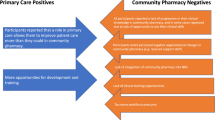Abstract
Background Traditionally, hospital pharmacists’ roles have been associated with dispensing medications prescribed by doctors and offering advice about medicines to patients and other healthcare professionals. In England, significant changes in the structure of hospital pharmacy practice began in the 1970s and currently hospital pharmacists are undertaking a number of advanced roles including prescribing. Objective This study investigated the facilitators to change in hospital pharmacy practice in England in order to identify lessons that might assist in the potential changes needed in other countries for extended clinical roles. Setting The study was conducted in England. Methods A qualitative study using semi-structured interviews was conducted with 28 participants, comprising 22 pharmacists and 6 pharmacy technicians from England. They were recruited through a snowball sampling technique. Transcribed interviews were entered into the QSR NVivo 10 software for data management and analysed thematically. Main outcome measure Pharmacists and pharmacy technicians’ perception of the facilitators to hospital pharmacy practice change in England. Result Three major themes emerged from this study: drivers for change, strategies for change and efficiency. Many of the drivers identified were linked to changes in the structure of hospital pharmacy including education and training; specialisation in practice and career structure. Strategies employed to achieve practice change included broadening the role of pharmacy technicians in order to free-up pharmacists’ time; seizing opportunities for extended roles; developing a relationship with the medical profession and professional leadership influence. Participants perceived that the development of pharmacists’ clinical roles have resulted in a more efficient healthcare provision where patients were offered seamless services. Conclusion Changes in the professional structure of pharmacy including education and training, specialisation, career structure and the roles of pharmacy technicians could benefit the development of pharmacists’ clinical roles in other countries.

Similar content being viewed by others
References
Doloresco F, Vermeulen LC. Global survey of hospital pharmacy practice. Am J Health Syst Pharm. 2009;66(5 Supplement 3):s13–9.
Van Mil J, Schulz M. A review of pharmaceutical care in community pharmacy in Europe. Harvard Health Policy Rev. 2006;7(1):155–68.
Alo A. Pharmacy in Nigeria. Am J Health Syst Pharm. 2006;63:670–3.
Basak SC, Sathyanarayana D. Pharmacy education in India. Am J Pharm Educ. 2010;74(4):68.
Child D, Cooke J. Clinical pharmacy services. In: Stephens M, editor. Hospital pharmacy. London: Pharmaceutical Press; 2003. ISBN 0853695024.
Stewart D, MacLure K, George J. Educating nonmedical prescribers. Br J Clin Pharmacol. 2012;74(4):662–7.
Anderson S. Making medicines: a brief history of pharmacy and pharmaceuticals. London: Pharmaceutical Press; 2005. ISBN 0853695970.
Kay EA. The changing role of the clinical pharmacist in rheumatology. Rheumatology. 1986;25(1):87–90.
Report of the working party of the hospital pharmaceutical service. London: Department of Health and Social Security Scottish Home and Health Department Welsh Office; 1970. ISBN 113209940.
Anderson S. The historical context of pharmacy. In: Taylor K, Harding G, editors. Pharmacy practice. London: Taylor & Francis; 2001. ISBN 0203303156.
Silcock J, Raynor DKT, Petty D. The organisation and development of primary care pharmacy in the United Kingdom. Health Policy. 2004;67(2):207–14.
The report of a committee of inquiry appointed by the Nuffield Foundation. London: The Nuffield Foundation; 1986. ISBN 0904956245.
Hobson RJ, Sewell GJ. Supplementary prescribing by pharmacists in England. Am J Health Syst Pharm. 2006;63(3):244–53.
Dawoud D, Griffiths P, Maben J, Goodyer L, Greene R. Pharmacist supplementary prescribing: a step toward more independence? Res Social Adm Pharm. 2011;7(3):246–56.
Braun V, Clarke V. Using thematic analysis in psychology. Qual Res Psychol. 2006;3(2):77–101.
Penm J, Chaar B, Moles R. Clinical pharmacy services that influence prescribing in the Western Pacific Region based on the FIP Basel Statements. Int J Clin Pharm. 2015;37(3):485–96.
Penm J, Moles R, Wang H, Li Y, Chaar B. Factors affecting the implementation of clinical pharmacy services in China. Qual Health Res. 2014;24(3):345–56.
Grilli R, Minozzi S, Tinazzi A, Labianca R, Sheldon TA, Liberati A. Do specialists do it better? The impact of specialization on the processes and outcomes of care for cancer patients. Ann Oncol. 1998;9(4):365–74.
Leape LL, Cullen DJ, Clapp MD, Burdick E, Demonaco HJ, Erickson JI, et al. Pharmacist participation on physician rounds and adverse drug events in the intensive care unit. JAMA. 1999;282(3):267–70.
Smith A, Darracott R. Review of pharmacist undergraduate education and pre-registration training and proposals for reform: Discussion paper. 2011, Modernising Pharmacy Careers Programme: Medical Education England. http://hee.nhs.uk/healtheducationengland/files/2012/10/Pharmacist-pre-registration-training-proposals-for-reform.pdf. Accessed 11 Oct 2014.
Canadian Pharmacists Association. CPhA position statement on a Doctor of Pharmacy degree as an entry-level to practice. 2011. http://www.pharmacists.ca/cpha-ca/assets/File/cpha-on-the-issues/PPDoctorOfPharmacyEN.pdf. Accessed 12 Jun 2014.
International Pharmaceutical Federation. FIP global pharmacy workforce report. The Hague: Fédération Internationale Pharmaceutique (FIP), 2012. http://www.fip.org/files/members/library/FIP_workforce_Report_2012.pdf. Accessed 13 Jul 2014.
Tan ACW, Emmerton L, Hattingh HL. A review of the medication pathway in rural Queensland, Australia. Int J Pharm Pract. 2012;20(5):324–39.
Johnston R, Saulnier L, Gould O. Best possible medication history in the emergency department: comparing pharmacy technicians and pharmacists. Can J Hosp Pharm. 2010;63(5):359.
Michels RD, Meisel SB. Program using pharmacy technicians to obtain medication histories. Am J Health Syst Pharm. 2003;60(19):1982–6.
Review of prescribing, supply & administration of medicines. Final report. 1999. http://webarchive.nationalarchives.gov.uk/20130107105354/http:/www.dh.gov.uk/prod_consum_dh/groups/dh_digitalassets/@dh/@en/documents/digitalasset/dh_4077153.pdf. Accessed 23 May 2013.
Anderson S. The state of the world’s pharmacy: a portrait of the pharmacy profession. J Interprof Care. 2002;16(4):391–404.
Acknowledgments
The authors are grateful to all the participants of this study.
Author information
Authors and Affiliations
Corresponding author
Ethics declarations
Funding
No financial support was obtained for this study.
Conflicts of interest
The authors do not have any conflict of interest to declare.
Rights and permissions
About this article
Cite this article
Auta, A., Maz, J. & Strickland-Hodge, B. Perceived facilitators to change in hospital pharmacy practice in England. Int J Clin Pharm 37, 1068–1075 (2015). https://doi.org/10.1007/s11096-015-0153-9
Received:
Accepted:
Published:
Issue Date:
DOI: https://doi.org/10.1007/s11096-015-0153-9




